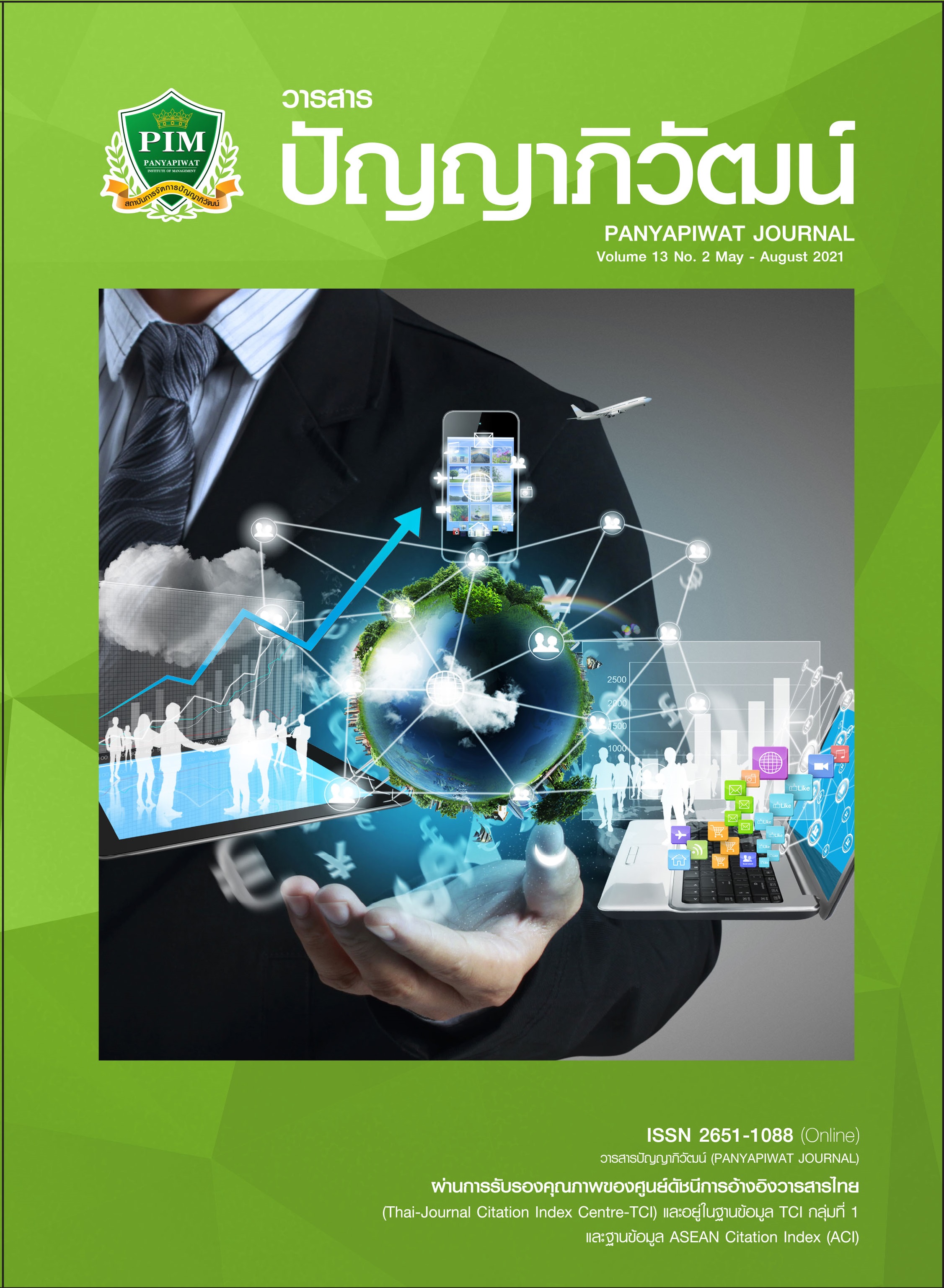อนาคตภาพของครูยุคดิจิทัลหลังจากวิกฤตการณ์โควิด 19
Main Article Content
บทคัดย่อ
การระบาดของเชื้อไวรัสโควิด 19 ทำาให้เกิดการเปลี่ยนแปลงครั้งใหญ่ของระบบการศึกษาทั่วโลก โดยเทคโนโลยีมีบทบาทสำาคัญที่ถูกนำามาใช้ในการจัดการศึกษาให้กับผู้เรียน ซึ่งเป็นเครื่องมือที่ช่วยพัฒนาและเติมเต็มศักยภาพการเรียนรู้ให้กับผู้เรียน แต่อย่างไรก็ตามเทคโนโลยีก็ยังไม่สามารถมาทดแทนครูผู้สอนได้ ดังนั้นในการเปลี่ยนแปลงครั้งนี้ครูผู้สอนต้องมีการปรับเปลี่ยนบทบาทของตัวเองให้เป็นผู้อำานวยความสะดวก (Facilitator) และให้แนวทางการเสริมต่อการเรียนรู้ (Scaffolding) มาสนับสนุนและพัฒนาศักยภาพของผู้สอนและผู้เรียนเพื่อให้ทันกับยุคดิจิทัล ซึ่งต้องเป็นผู้ริเริ่มสร้างสรรค์ในการผนวกเนื้อหาวิชา วิธีการสอนและเทคโนโลยีมาสนับสนุนการเรียนการสอน สร้างเครือข่ายทางวิชาชีพและต้องยึดมั่นในอาชีพและจรรยาบรรณแห่งวิชาชีพครู เพื่อจัดสภาพแวดล้อมให้เอื้ออำานวยและยืดหยุ่นต่อการจัดกิจกรรมการเรียนรู้ให้ผู้เรียนได้เรียนรู้ทุกที่ทุกเวลาและมีการใช้ความรู้อย่างสร้างสรรค์
Article Details

อนุญาตภายใต้เงื่อนไข Creative Commons Attribution-NonCommercial-NoDerivatives 4.0 International License.
“ข้าพเจ้าและผู้เขียนร่วม (ถ้ามี) ขอรับรองว่า บทความที่เสนอมานี้ยังไม่เคยได้รับการตีพิมพ์และไม่ได้อยู่ระหว่างกระบวนการพิจารณาลงตีพิมพ์ในวารสารหรือแหล่งเผยแพร่อื่นใด ข้าพเจ้าและผู้เขียนร่วมยอมรับหลักเกณฑ์การพิจารณาต้นฉบับ ทั้งยินยอมให้กองบรรณาธิการมีสิทธิ์พิจารณาและตรวจแก้ต้นฉบับได้ตามที่เห็นสมควร พร้อมนี้ขอมอบลิขสิทธิ์บทความที่ได้รับการตีพิมพ์ให้แก่สถาบันการจัดการปัญญาภิวัฒน์หากมีการฟ้องร้องเรื่องการละเมิดลิขสิทธิ์เกี่ยวกับภาพ กราฟ ข้อความส่วนใดส่วนหนึ่งและ/หรือข้อคิดเห็นที่ปรากฏในบทความข้าพเจ้าและผู้เขียนร่วมยินยอมรับผิดชอบแต่เพียงฝ่ายเดียว”
เอกสารอ้างอิง
Chaimin, C. (2019). MOOC: Life Long Learning in the 21st Century. Journal of Humanities and Social Sciences, CMRU, 1(1), 46-70.
Chaimongkol, M. (2020). Creative Update. Creative Thailand Magazine, 11(7), 6-9. [in Thai]
Chosangnin, C. (2019). Digital Intelligence. Retrieved April 10, 2020, from https://www.scimath. org/article-technology/item/10611-digital-intelligence [in Thai]
Finn, A. & Bucceri, M. (2004). A Case Study Approach to Blended Learning. Retrieved April 12, 2020, from http://www.centra.com/download/whitepapers/CaseStudy_BlendedLearning.pdf
Hongkhunthod, A. (2015). Technological Pedagogical Knowledge: TPK. Retrieved February 1, 2015, from http://pitcforteach.blogspot.com/ 2015/ 03/tpack-model.html [in Thai]
Jai-on, K. (2018). Handbook of Technology Pedagogical Content Knowledge (TPCK) for Education. Journal of Education Khonkaen University, 41(3), 119-122. [in Thai]
Koehler, M. J. & Mishra, P. (2011). What is TPACK? Retrieved May 8, 2020, from http://www.tpack.org/
Megan, K. (2018). Summer Learning Loss: What We Know and What We’re Learning. Retrieved September 4, 2018, from https://www.nwea.org/blog/2018/summer-learning-loss-whatwe-know-what-were-learning/
Mesinree, S. (2020). The World Changes, People Change: Preparing Thai people to be Perfect Humans after COVID 19. Bangkok: Ministry of Higher Education, Science, Research and Innovation. [in Thai]
Nuangchalerm, P. (2020). Teachers in the 21st Century. Journal of Humanities and Social Science Mahasarakham University, 39(1), 15-24. [in Thai]
Osvaldo, M. & Coats, C. (2009). Integrated Networks: National and International Online Experiences. International Review of Research in Open and Distance Learning, 10(1), 1-19.
Phoodee, W., Wongchai, R., & Preechaporn, W. (2019). Challenges of Mathematics Teacher in STEM Instruction. Veridian E-Journal, Silpakorn University (Humanities, Social Sciences and Arts), 12(6), 753-765. [in Thai]
Phoodee, W. (2019). Mathematics Instruction in Digital Age: Methods and Tools. Journal of Science and Science Education (JSSE), 3(2), 1-7. [in Thai]
Plengcharoenchai, C. (2017). Moocs Technology for Online Education. Chritian University Journal, 23(2), 521-531. [in Thai]
PISA Thailand. (2020). How Well are Schools and Students Equipped with Online Education: Findings from PISA. Retrieved April 10, 2020, from https://pisathailand.ipst.ac.th/issue-2020-51/ [in Thai]
Reimers, Fernando, M., & Schleicher, A. (2020). A Framework to Guide an Education Response to the COVID-19 Pandemic of 2020. Retrieved May 10, 2020, from https://www.hm.ee/sites/ default/files/ framework_guide_v1_002_harward.pdf
Rueangrong, P. (2014). Education Technology VS Thai Teacher in 21th Century. Panyapiwat Journal, 5(Special), 195-207. [in Thai]
Seels, B. & Glasgow, Z. (1997). Making Instructional Design Decisions. New Jersey: Prentice Hall.
Smith, J. M. (2001). Blended Learning: An Old Friend Gets a New Name. Retrieved April 15, 2020, from http://www.gwsae.org/Executiveupdate/2001/March/blended.htm
Thongliamnak, P. (2020). To Prepare for Education in the COVID-19 Era, It is Even More Important to Focus on the Inequality and Resources of Students. Retrieved May 8, 2020, from https://www.eef.or.th/378/ [in Thai]
Vygotsky, L. (1978). Mind in Society: The Developmental of Higher Psychological Process. Cambridge, MA: Harvard University Press.


